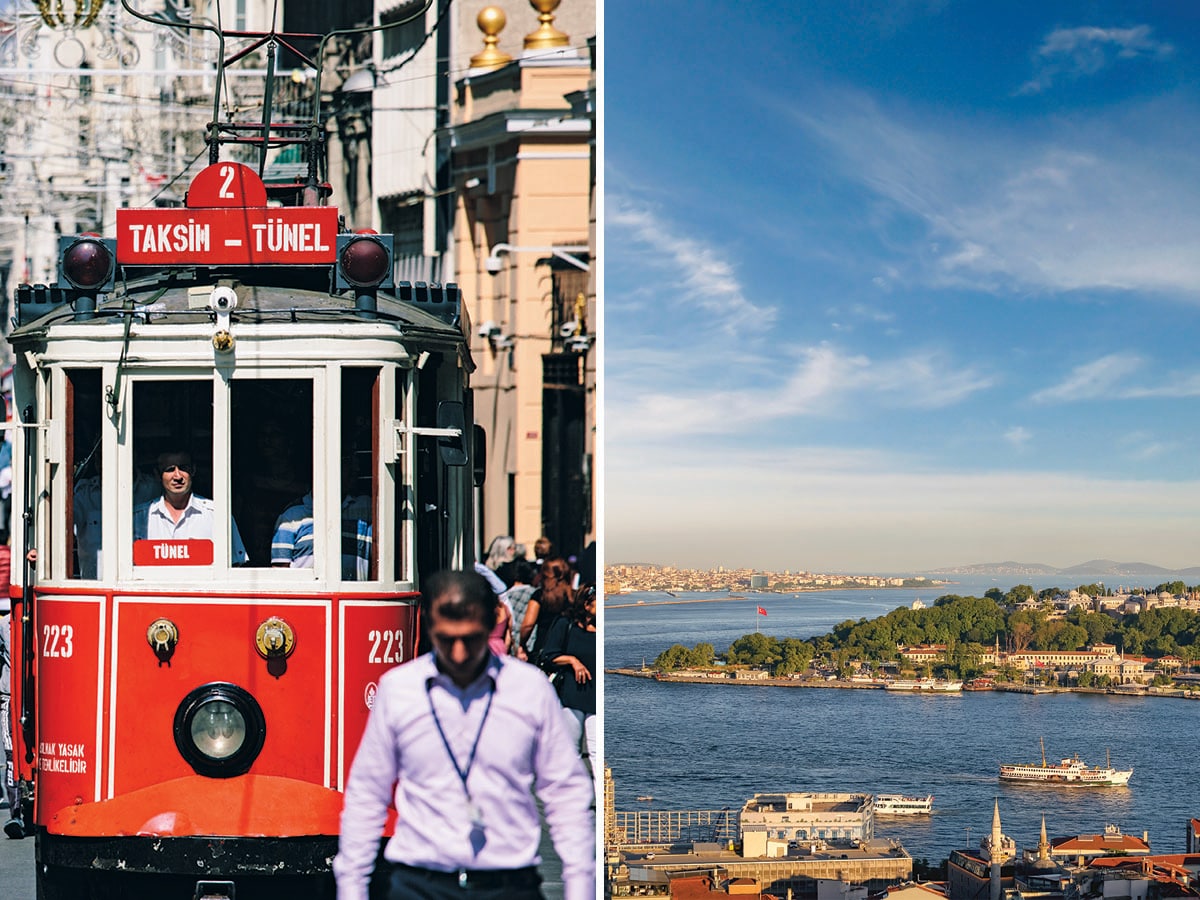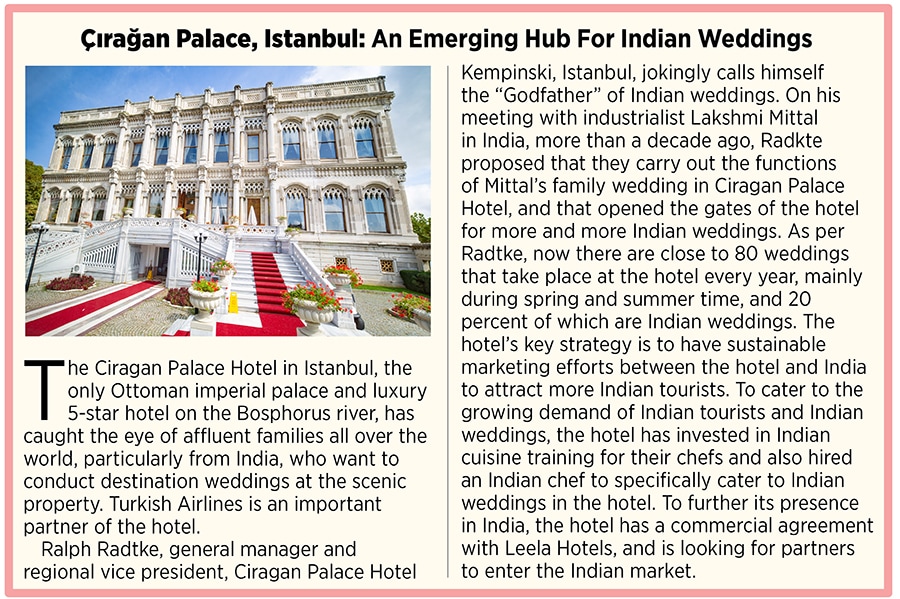 Ahmet Olmustur, Chief Commercial Officer, Turkish Airlines. Image: Courtesy Turkish Airlines
Ahmet Olmustur, Chief Commercial Officer, Turkish Airlines. Image: Courtesy Turkish Airlines
Turkish Airlines has been serving passengers since 1933, and flies to more countries than any other airline in the world. This includes 351 destinations in 130 countries. In the past few years, Türkiye has seen a significant increase in the number of Indian travellers visiting the country, and saw 1,64,373 Indian tourists in the first six months of 2024. As per Ahmet Olmuştur, chief commercial officer, Turkish Airlines, this marks a 33.2 percent increase compared to the same period in 2023.
With an aim to further increase the number of Indian tourists in Türkiye, the airline has launched initiatives such as ‘Stopover in Istanbul Programme’ and ‘Touristanbul’, in a bid to attract close to four lakh Indian visitors by 2025. The airline is also striving to be a carbon neutral airline by 2050.
In conversation with Forbes India, Olmuştur talks about the airlines’ positioning in India, the relationship between India and Türkiye, its sustainability goals, and more. Edited excerpts:
Q. How does Turkish Airlines position itself within the competitive landscape of Indian airlines? What is the airline’s market share in India?
We are confident of our market positioning in India, benefiting from our extensive global network, unparalleled inflight offerings, and the hospitality we provide to our guests. Along with our strong codeshare partnership with IndiGo Airlines we offer expanded connectivity within India, serving cities like Ahmedabad, Kolkata, Hyderabad, Bangalore, and Chennai via key hubs such as Delhi and Mumbai. We are currently operating 14 weekly flights between Türkiye and India and continue to work on further expansion in the Indian market, and we are continuously working on enhancing Turkish Airlines’ visibility and competitiveness in the region.
Q. What strategies are being implemented to increase market share in this region, especially in the face of growing competition?
Our growth strategies in the face of growing competition, especially from Indian carriers expanding their wide-body fleet for long-haul destinations, include several initiatives. By leveraging Istanbul as a major transit hub, we aim to facilitate smoother connections for Indian passengers. The deployment of wide-body B777 aircraft has helped increase the number of passengers. Stopover in Istanbul Programme and Touristanbul initiatives encourage Indian travelers with a layover of at least 20 hours to explore Istanbul by offering free accommodation at select partner hotels. Additionally, we provide a complimentary Touristanbul service for international transfer passengers with layovers of 6 to 24 hours. This service includes guided tours tailored to passengers’ flight schedules, allowing them to explore Istanbul’s historical landmarks and enjoy Turkish cuisine. Both initiatives have garnered positive engagement from Indian travelers, leading to favorable feedback and a noticeable increase in bookings from India.
Q. Where does Turkish Airlines position itself in terms of sustainability and technological advancements?
We have set a strategic goal to become one of the top three global airlines in digitalisation while also working toward a carbon-neutral status by 2050.
As part of its comprehensive climate change mitigation strategy, we began integrating Sustainable Aviation Fuel (SAF) into our operations in 2022, further expanding SAF usage across more routes in 2023. Our voluntary carbon offset platform, CO2mission, allows passengers to offset emissions from their flights, adding to a suite of sustainability initiatives that include sustainable in-flight products, effective waste management practices, and an overall commitment to offering passengers a more sustainable travel experience. These efforts contributed to Turkish Airlines being named the “Most Sustainable Flag Carrier Airline” in World Finance’s Sustainability Awards 2024.
 Turkish Airlines’ Business Class Lounge; Inside a Turkish Airlines flight. Image: Courtesy Turkish Airlines
Turkish Airlines’ Business Class Lounge; Inside a Turkish Airlines flight. Image: Courtesy Turkish Airlines
We have also pioneered sustainable aviation finance by securing its first Sustainability-Linked Loan for two Airbus A321NEO aircraft, which are recognized for their environmental performance. This innovative financing model, structured by Société Générale, is linked to specific Sustainability Performance Targets (SPTs) aimed at reducing the airline’s carbon intensity. This step aligns with international aviation standards and exemplifies Turkish Airlines’ commitment to fleet renewal and sustainable growth.
In terms of technological advancements, Turkish Airlines continues to invest in cutting-edge technology to enhance passenger experience. Currently, 86 percent of the fleet offers internet connectivity, with free access available to Miles&Smiles loyalty members and business class passengers. Looking ahead, we plan to incorporate low Earth orbit (LEO) satellite technology starting from the end of 2025. This step aims to provide free, fast, and uninterrupted internet for all passengers within two years, reinforcing our commitment to digitalization and setting new standards in passenger satisfaction in the digital age. By integrating sustainable practices and digital advancements across its operations, we aim to lead the aviation industry toward a greener and more connected future.
Q. How has the overall tourism industry in India evolved, in terms of travel to Türkiye, post-pandemic? Are there any specific trends that you’ve observed?
In 2019, Türkiye welcomed approximately 2,30,000 Indian tourists as per the data by Turkiye Tourism. By 2023, this number rose to 2,70,000, marking a 20 percent increase compared to 2022. The Turkish tourism authorities aim to attract between 3,50,000 to 4,00,000 Indian visitors by 2025, indicating a robust recovery and growth trajectory for Indian tourism to Türkiye. We believe India is an emerging source market for Turkish tourism.
A noticeable trend among Indian visitors is the rise in Free Independent Travelers (FITs) who explore Türkiye’s cultural heritage, shopping, and dining at their own pace. Istanbul remains a top destination, with Cappadocia also drawing considerable interest. Coastal areas like Antalya and Bodrum are particularly popular for unique wedding ceremonies, honeymoons, and luxurious events. Additionally, places like Pamukkale, İzmir, and Alaçatı are seeing significant tourist numbers.
Q. How has the recovery from the pandemic affected Turkish Airlines’ operations in India, and what metrics indicate growth or decline?
Post-pandemic, Turkish Airlines has experienced a significant resurgence in tourism from India to Türkiye. In the first six months of 2024, we welcomed 1,64,373 Indian visitors, marking a remarkable 33.2 percent increase compared to the same period in 2023. This growth underscores the strong recovery of travel demand and highlights Türkiye’s increasing appeal as a prime destination for Indian travelers. We are excited about the potential for further growth in this market and look forward to welcoming even more travelers from India in the future.
Q. What are some of the main attractions drawing tourists to Türkiye?
Indian travelers have increasingly shown a keen interest in exploring Türkiye’s rich cultural heritage and historical significance. The country is a captivating blend of the ancient and the modern, combining elements of the East and West. Often described as the cradle of civilization, it has witnessed pivotal moments in world history and today stands as one of the world’s biggest and fastest-growing tourism destinations. While 51.7 million tourists visited Türkiye in 2019, this number increased by 9.5 percent to 56.7 million in 2023, ranking 5th in the world. While the proportion of international tourists arriving by air is approximately 60 percent worldwide, it is three out of every four foreigners (75.7 percent) for Türkiye. This situation makes tourism and civil aviation mutually important.
 Istanbul City; Topkapi Sarayi, Istanbul. Image: Courtesy Turkish Airlines
Istanbul City; Topkapi Sarayi, Istanbul. Image: Courtesy Turkish Airlines
This phenomenal growth in tourism is centered around Istanbul and Antalya, labelling them as some of the most visited cities in 2023 by Euromonitor International. Last year Istanbul topped the list and welcomed 20.2 million visitors and Antalya was not far behind, surpassing renowned cities like Paris, New York, and Bangkok in visitor numbers.
I should specifically mention Stone Hills and Göbeklitepe which reshaped the history of humanity. These are the places where we witness the first human settlements and agriculture, as well as an astounding cultural production. These places are also getting a lot of tourist attractions lately. Besides these destinations, there are lots of other cities such as Cappadocia, Afyon, Izmir, Konya that fascinate visitors. All of these sites are usually only 1-hour flight away from Istanbul with great domestic connection.
Q. How do cultural ties and heritage influence Indian tourism to Türkiye?
India and Türkiye share a longstanding history of cultural interaction, with exchanges spanning centuries. This shared heritage deeply influences Indian tourism to Türkiye, where familiar elements in literature, architecture, and cuisine resonate with Indian travelers. Türkiye’s appeal is further enhanced by trends like destination weddings and immersive cultural experiences, making it an attractive choice for Indian tourists. Turkish Airlines plays a pivotal role in fostering these connections, promoting cultural ties, and enhancing travel accessibility, positioning Türkiye as a vibrant cultural destination for Indians.
Q. Are there any specific marketing initiatives planned to promote Turkish destinations to Indian travelers?
Turkish Airlines has collaborated with the Outbound Tour Operators Association of India (OTOAI) and the Türkiye Tourism Promotion and Development Agency (TGA) to strengthen ties with the Indian travel industry. This partnership aims to foster deeper cultural exchanges and provide Indian travel agents with firsthand experience of Türkiye as a destination, thereby promoting travel between India and Türkiye.
Q. Are there plans to increase flight frequencies or introduce new routes between India and Türkiye to facilitate easier access for travelers?
We are actively working with the Indian government to explore opportunities for increasing flight frequencies between Türkiye and India. Currently, we operate 14 weekly flights between the two countries, but our goal is to expand this number to meet the rising demand for international travel. This aligns with our broader strategy of enhancing connectivity and providing more travel options for Indian passengers as part of our continued growth in the Indian market.

Q. What is your vision for Turkish Airlines’ role in the Indian travel market over the next 5 years?
Turkish Airlines envisions significant growth in the Indian market and aims to expand its operations by increasing flight frequencies. The airline also aims to strategically expand its routes, taking advantage of India’s rapid economic growth and the increasing international travel demand from the region.
(The writer travelled to Istanbul on invitation from Turkish Airlines.)
